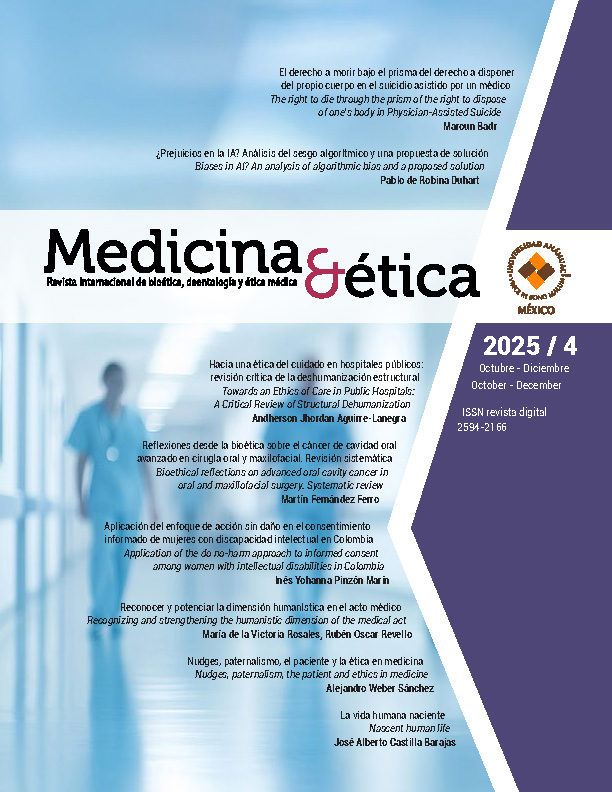Nudges, paternalism, the patient and ethics in medicine
Main Article Content
Abstract
Medical advice and recommendations should always consider the patient as a person, considering their dignity in particular. Analyzing the decision-making process is important to understand that the patient must make the decision freely, and the doctor must strive to consider their reasons, feelings, and context to create a therapeutic alliance, with respect and compassion, avoiding the dominant and authoritarian paternalism of the past. Thaler and Sunstein’s proposal of “libertarian paternalism” to change the environment and facilitate good decisions without coercion may be appropriate, provided that the doctor-patient relationship is capable of achieving that human bond of friendship, so that the patient trusts and accepts what the doctor proposes when they have been informed and educated about what is best for their health, promoting a more humanized, ethical medicine committed to the overall well-being of the human being.
Downloads
Article Details
Section

This work is licensed under a Creative Commons Attribution-NonCommercial-ShareAlike 4.0 International License.
Medicina y Ética is distributed under a Creative Commons License Atribución-NoComercial-CompartirIgual 4.0 Internacional.
The author keeps the property rights with no restriction whatsoever and guarantees the magazine the right to be the first publication of the work. The author is free to deposit the published version in any other medium, such as an institutional archive or on his own website.
How to Cite
References
1. Vigo A. Deliberación y decisión según Aristóteles. Tópicos Rev Filos. 2013; (43): 51-92. https://doi.org/10.21555/top.v0i43.32
2. Gallagher D. Tomás de Aquino, la voluntad y la Ética a Nicómaco. Tópicos RevFilos. 2013; 6(1), 59-70. https://doi.org/10.21555/top.v6i1.498
3. Tomás de Aquino. Suma Teológica Parte I-II, cuestión 13, artículo 6, obj.3.
4. Llano C. Examen filosófico del acto de la decisión. Ciudad México: Universidad Panamericana, Publicaciones Cuz; 1998.
5. Kvitko L. La Relación Médico Paciente hipocrática. Med Leg Costa Rica. 2010;27(1): 7-14. Disponible en: http://www.scielo.sa.cr/scielo.php?script=sci_arttext&pid=S1409-00152010000100002
6. Mendoza F. La relación médico paciente: consideraciones bioéticas. Rev Peru Ginecol Obstet. 2017; 63(4): 555-64. Disponible en: http://www.scielo.org.pe/scielo.php?script=sci_arttext&pid=S2304-51322017000400007
7. García M. La estructura de la historia. En: Obras Completas II/2, Madrid: Ediciones Rialp; 1957.
8. Herranz G. El respeto, actitud ética fundamental en Medicina. Lección inaugural del curso 1985–86, Universidad de Navarra, Pamplona, 3 de octubre de 1985. Disponible en: https://www.unav.edu/web/unidad-de-humanidades-y-etica-medica/material-de-bioetica/el-respeto-actitud-etica-fundamental-en-la-medicina#gsc.tab=0
9. Cambridge dictionary [Internet]. Nudge. Disponible en: https://dictionary.cambridge.org/dictionary/english-spanish/nudge
10. Thaler R, Sunstein C. Un pequeño empujón: El impulso que necesitas para tomar mejores decisiones sobre salud, dinero y felicidad. Bogotá: Taurus; 2008.
11. Blumenthal-Barby J, Krieger H. Cognitive biases and heuristics in medical decision making: a critical review using a systematic search strategy. Med Decis Making. 2015; 35(4):539-57. https://doi.org/10.1177/0272989X14547740
12. Silva J. Sesgos, heurísticas y arquitectura de las decisiones: “Un pequeño empujón” como introducción al paternalismo libertario de Richard H. Thaler y Cass R.Sunstein Soci Econ. 2018; (35): 221-4. Disponible en: https://www.redalyc.org/journal/996/99659352011/99659352011.pdf
13. Alemany G. El concepto y la justificación del paternalismo [Tesis doctoral]. Alicante; 2005.
14. Oxford English Dictionary. Voz “Paternalism”. Oxford Clarendon Press; 1970.
15. Real Academia Española. Voz “Paternalismo”. Diccionario de la lengua española.[Internet]. 2025. Disponible en: https://dle.rae.es/paternalismo
16. Resta E. Metáfora del contrato. Doxa. 1988; (5):227-42. Disponible en: https://rua.ua.es/server/api/core/bitstreams/ccb2276a-e9e6-4eec-ab9b-295c6375303b/content
17. Viesca C. Parernalismo Médico. México: Instituto de Investigaciones Jurídicas, Universidad Nacional Autónoma de México; 2017
18. García F. Paternalismo médico. En: Tealdi, JC editor. Diccionario latinoamericano de bioética. Bogotá: Universidad Nacional de Colombia; UNESCO; Red Bioética; 2008.
19. Dworkin G. Paternalismo. En: Becker LC, editor. Encyclopedia of Ethics. Nueva York: Garland; 1992.
20. Diaz P: Algunos problemas conceptuales del paternalismo y la autonomía moral individual con posible aplicación en el ámbito del tratamiento. Cuad Bioét. 1997; 31(8):1157-63. Disponible en: https://www.bioeticaweb.com/paternalismo-y-la-autonomasa-moral-individual-con-posible-aplicaciasn-en-el-aimbito-del-tratamiento-prof-dasaz-pintos/
21. Chivato P, Piñas MA. Editores. La relación médico paciente. Claves para un encuentro humanizado. Madrid: Dykinson; [s.f.]
22. Pardo A. La ética en medicina. Pers Bioét. 2011; 15(2): 166-83. https://doi.org/10.5294/pebi.2011.15.2.4
23. Besio R. El acto médico: ¿una creación original? Reflexiones sobre su esencia, surgimiento y riesgos a los que se expone. Acta Bioeth. 2010; 16(1), 51-60. https://dx.doi.org/10.4067/S1726-569X2010000100008
24. Weber S. Consentimiento informado en Oncología. Reflexiones sobre su aspecto ético. October 2016; Gaceta Mexicana de Oncología. 2016; 15(5).https://doi.org/10.1016/J.GAMO.2016.08.003
25. INFAC. Participación del paciente en la toma de decisiones. INFAC. 2014; 22(3) [Consultado 31 de mayo de 2025]. Disponible en: https://www.euskadi.eus/contenidos/informacion/cevime_infac_2014a/es_def/adjuntos/INFAC_Vol_22_n_3_Decisiones_compartidas.pdf

